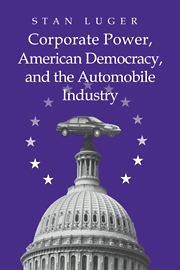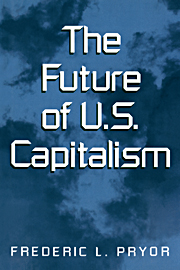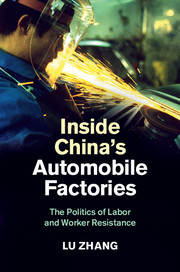Corporate Power, American Democracy, and the Automobile Industry
This book offers a critical history of government policy toward the US automobile industry in order to assess the impact of the large corporation on American democracy. It offers the first book-length treatment of the power of the nation's largest industry. Drawing together the main policy issues affecting the automobile industry over the past forty years - occupant safety, emissions, fuel economy and trade - the work examines how the industry established its hegemony over the public perception of vehicle safety to inhibit federal regulation and the battle for federal regulation which succeeded in toppling this hegemony in 1966; the subsequent efforts to include pollution emissions and fuel economy under federal mandates in the 1970s; the industry's resurgence of influence in the 1980s; and the mixed pattern of influence in the 1990s. The analysis seeks to uncover factors that enhance corporate political influence, and those that constrain corporate power, allowing for public interest forces to be successful.
- Most up-to-date study of the auto industry and its interactions with lawmakers and consumers
- Controversial thesis: auto industry has historically all along not been open about autos' negative effects
- Will be avidly read by progressive audiences in political science, sociology, American history, and economics of industry
Reviews & endorsements
"A calm, analytic, probing, documented and riveting critique of Washington's kowtowing to Detroit, and the efforts of consumer and environmental groups, on behalf of motorists, safety and clean air, to stop the melding of this corporate state." Ralph Nader, Washington D.C.
"Stan Luger has written a first-rate study of corporate power in modern America. By dissecting the relationship of the automobile industry to government, he reveals the structural roots of business power, and also the conditions under which the grip of business on government is sometimes relaxed. Thus illuminating and nuanced study speaks directly to the political limits and possibilities of our time." Frances Fox Piven, City University of New York
"Stan Luger provides us with a rich and troubling account of the U.S. automobile industry's political power during the last half century. The evidence that he amasses forces us to consider the parallels with the tobacco industry. Will future historians group these together as 'outlaw industries' that skillfully used political power to avert effective regulation of dangerous products?" Fred Block, University of California, Davis
"...a scholarly study of the history of the power and influence of the automobile industry on governmental policies and the interactions of government, automobile industry, and societal pressures...the author does a creditable job of presenting the material. For readers interested in policymaking with respect to the automobile industry, it is a jolly good read." The Flying Lady, Rolls-Royce Owners' Club.
Product details
November 2005Paperback
9780521023610
220 pages
229 × 154 × 14 mm
0.338kg
1 b/w illus. 2 tables
Available
Table of Contents
- Acknowledgments
- Introduction
- 1. Studying power in America
- 2. The structure of the auto industry
- 3. Corporate political hegemony and its decline:
- 1916–66
- 4. The politics of compromise:
- 1967–78
- 5. The resurgence of corporate power:
- 1979–81
- 6. The triumph of corporate power: regulatory policy, 1981–8
- 7. The triumph of corporate power: trade policy, 1981–5
- 8. Interregnum:
- 1989–96
- Conclusion: corporate power and American democracy
- Index.




